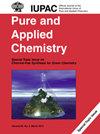Facile and green hydrothermal synthesis of MgAl/NiAl/ZnAl layered double hydroxide nanosheets: a physiochemical comparison
IF 2
4区 化学
Q3 CHEMISTRY, MULTIDISCIPLINARY
引用次数: 0
Abstract
Layered double hydroxide (LDH) exhibits a remarkable trait referred to as the ‘memory effect,’ demonstrating its capacity to reconstruct its layered structure from calcined oxides through hydrothermal treatment. Its uniqueness has garnered significant interest from researchers in both industrial and academic domains. Various methods have been utilized to synthesize LDH but most LDH studies still utilize alkali precipitants which might taint the final LDH product. Thus, in this study, layered double hydroxides involving MgAl/NiAl/ZnAl were synthesized via an alkali-free hydrothermal approach in which the formed precipitates of LDH were thermally destroyed via calcination at 450 °C before undergoing a rehydration treatment at 110 °C for 24 h to restore its original structure. Particularly, the physiochemical properties of MgAl/NiAl/ZnAl LDH have been undertaken by multiple techniques such as Powder X-ray Diffraction (PXRD), thermogravimetric analysis (TGA), Brunauer-Emmett-Teller (BET), Field Emission Scanning Electron Microscope (FESEM) and Fourier-transform infrared spectroscopy (FTIR). The resultant products exhibited exceptional crystallinity, accompanied by notably larger crystallite sizes and crystallinity index, particularly post-hydrothermal treatment. Among the fresh and calcined products studied, those subjected to HTM (4:1) treatment demonstrated the highest specific surface area and crystallinity surpassing both the fresh and calcined samples. In essence, this research showcased how utilizing the hydrothermal approach resulted in the most substantial increase in crystallite size and specific surface area.MgAl/NiAl/ZnAl 层状双氢氧化物纳米片的简便绿色水热合成:理化比较
层状双氢氧化物(LDH)具有被称为 "记忆效应 "的显著特征,表明它能够通过水热处理从煅烧氧化物中重建其层状结构。它的独特性引起了工业和学术领域研究人员的极大兴趣。合成 LDH 的方法多种多样,但大多数 LDH 研究仍然使用碱沉淀剂,这可能会玷污 LDH 的最终产品。因此,本研究采用无碱水热法合成了 MgAl/NiAl/ZnAl 层状双氢氧化物,通过 450 °C 煅烧对形成的 LDH 沉淀进行热破坏,然后在 110 °C 下进行 24 小时的再水化处理,以恢复其原始结构。特别是通过粉末 X 射线衍射 (PXRD)、热重分析 (TGA)、Brunauer-Emmett-Teller (BET)、场发射扫描电子显微镜 (FESEM) 和傅立叶变换红外光谱 (FTIR) 等多种技术对 MgAl/NiAl/ZnAl LDH 的理化性质进行了研究。研究结果表明,产品的结晶度极高,结晶尺寸和结晶度指数明显增大,尤其是经过水热处理后的产品。在所研究的新鲜和煅烧产品中,经过 HTM(4:1)处理的产品比表面积和结晶度最高,超过了新鲜和煅烧样品。从本质上讲,这项研究展示了如何利用水热法最大幅度地增加晶体尺寸和比表面积。
本文章由计算机程序翻译,如有差异,请以英文原文为准。
求助全文
约1分钟内获得全文
求助全文
来源期刊

Pure and Applied Chemistry
化学-化学综合
CiteScore
4.00
自引率
0.00%
发文量
60
审稿时长
3-8 weeks
期刊介绍:
Pure and Applied Chemistry is the official monthly Journal of IUPAC, with responsibility for publishing works arising from those international scientific events and projects that are sponsored and undertaken by the Union. The policy is to publish highly topical and credible works at the forefront of all aspects of pure and applied chemistry, and the attendant goal is to promote widespread acceptance of the Journal as an authoritative and indispensable holding in academic and institutional libraries.
 求助内容:
求助内容: 应助结果提醒方式:
应助结果提醒方式:


